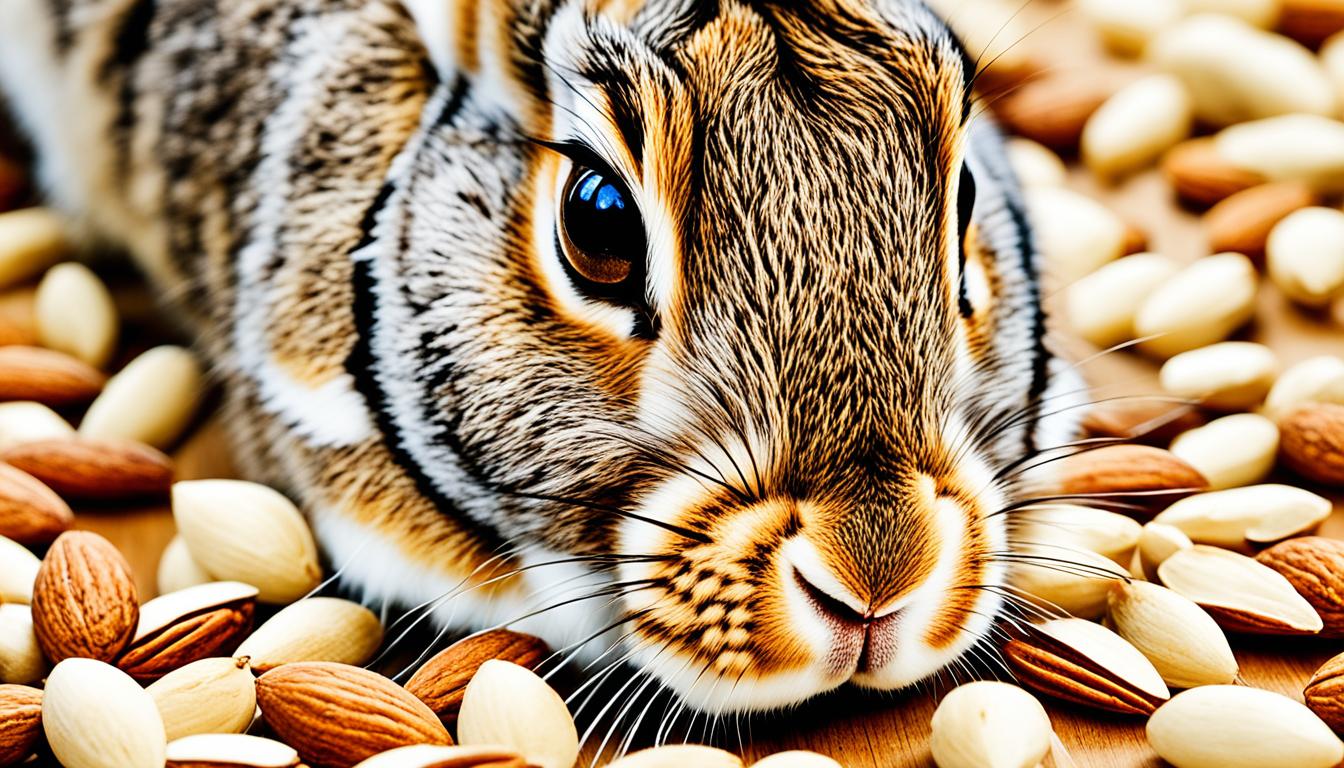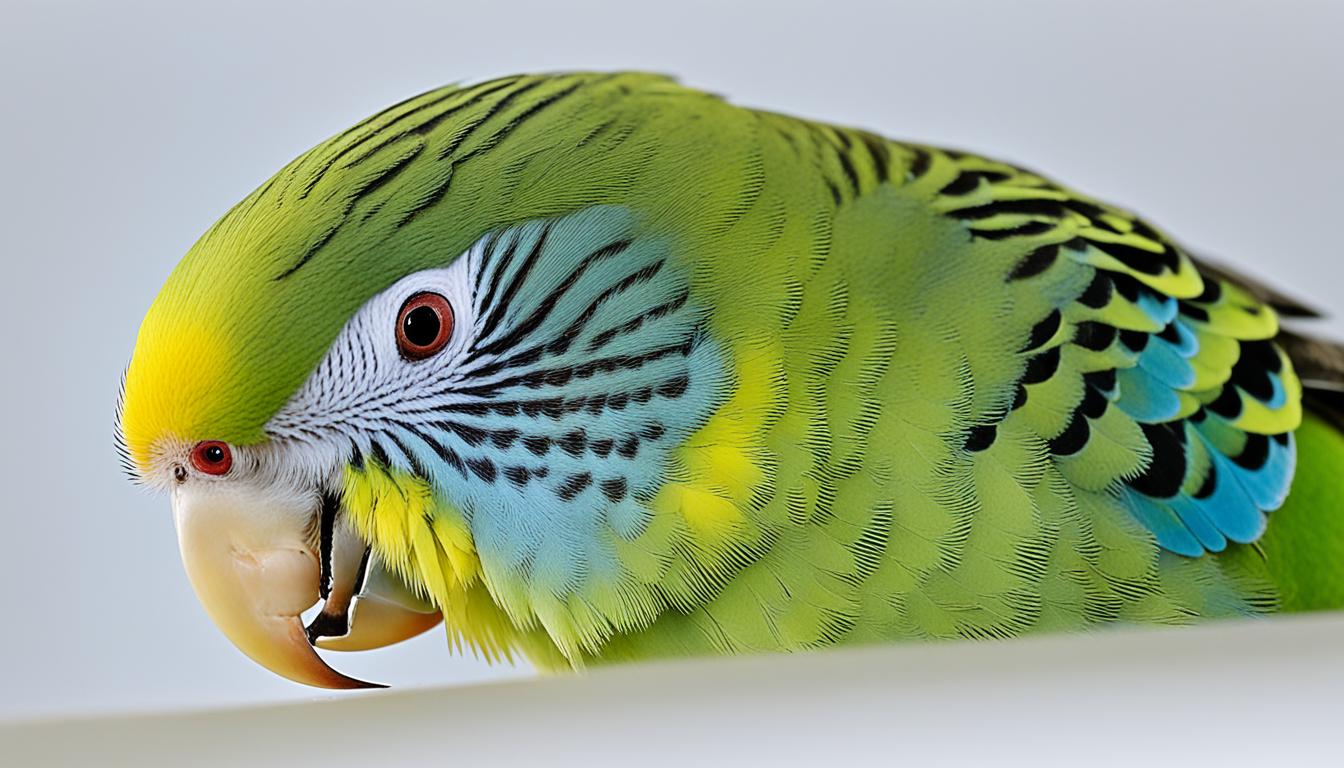Did you realize that almonds, which are considered a healthy snack for people, can actually be dangerous for rabbits? While it may be unexpected, giving almonds to rabbits can result in serious health issues. Rabbits require a specific diet, and some foods, like almonds, can be harmful to their overall well-being. This article will explore the reasons why almonds are not suitable for rabbits and the potential risks they present.
As much as we may enjoy almonds, rabbits cannot digest them properly and they should be avoided altogether. Almonds contain a high amount of fat, which can lead to digestive issues in rabbits. In addition, bitter almonds contain cyanide, a toxic substance that is dangerous for rabbits. Poisoning from cyanide can have severe consequences for a rabbit’s health, including dehydration, weight loss, depression, loss of appetite, and even death.
It is essential to prioritize a diet that meets rabbits’ specific nutritional needs and avoids potential harm. Let’s explore the reasons why almonds are not safe for rabbits and the potential risks associated with feeding them.
Key Takeaways:
- Rabbits cannot safely consume almonds due to their high fat content and the presence of cyanide in bitter almonds.
- Feeding almonds to rabbits can lead to digestive issues, dehydration, weight loss, loss of appetite, and even death.
- Rabbits have specific dietary needs and require a high-fiber diet, making almonds unsuitable for their nutritional requirements.
- Monitoring rabbits’ behavior and seeking veterinary attention is crucial if they accidentally consume too many almonds.
- Offering a balanced diet that consists of fresh vegetables and high-quality hay is the best way to ensure rabbits’ health and well-being.
The Health Benefits of Almonds
Almonds are known for their numerous health benefits, packed with essential nutrients that support overall well-being. While they offer various advantages for humans, it’s important to note that rabbits have specific dietary requirements and cannot safely consume almonds.
Almonds are not suitable for rabbits.
However, let’s explore the impressive nutritional value and health benefits of almonds for humans:
- Almonds are a rich source of vitamin E, which is an antioxidant that helps protect the cells from damage.
- They contain magnesium, which plays a vital role in nerve function, muscle contraction, and overall bone health.
- Phosphorus is another essential mineral found in almonds, supporting bone formation and energy production.
- High calcium content contributes to maintaining strong bones and teeth.
Moreover, almonds are a good source of healthy fats, protein, and fiber. These nutrients provide energy, support muscle growth and repair, and help maintain a healthy digestive system.
“Almonds are packed with essential nutrients that support overall well-being.”
Additionally, almonds have been associated with various health benefits in humans, including:
- Boosting immunity: Almonds’ nutrient profile, including vitamin E and antioxidants, may enhance the immune system’s function, helping the body fight off infections and diseases.
- Lowering cholesterol levels: Regular almond consumption has been linked to reducing LDL (bad) cholesterol while maintaining or increasing HDL (good) cholesterol.
- Regulating blood pressure and blood sugar: The healthy fats, fiber, and magnesium in almonds may aid in controlling blood pressure and glucose levels.
- Contributing to weight management: Almonds’ combination of protein, fiber, and healthy fats can promote satiety and assist in weight management.
- Strengthening bones: The calcium and phosphorus content in almonds support bone health and may help prevent conditions like osteoporosis.
- Aiding in better sleep: Almonds contain magnesium, which can help relax muscles and improve sleep quality.
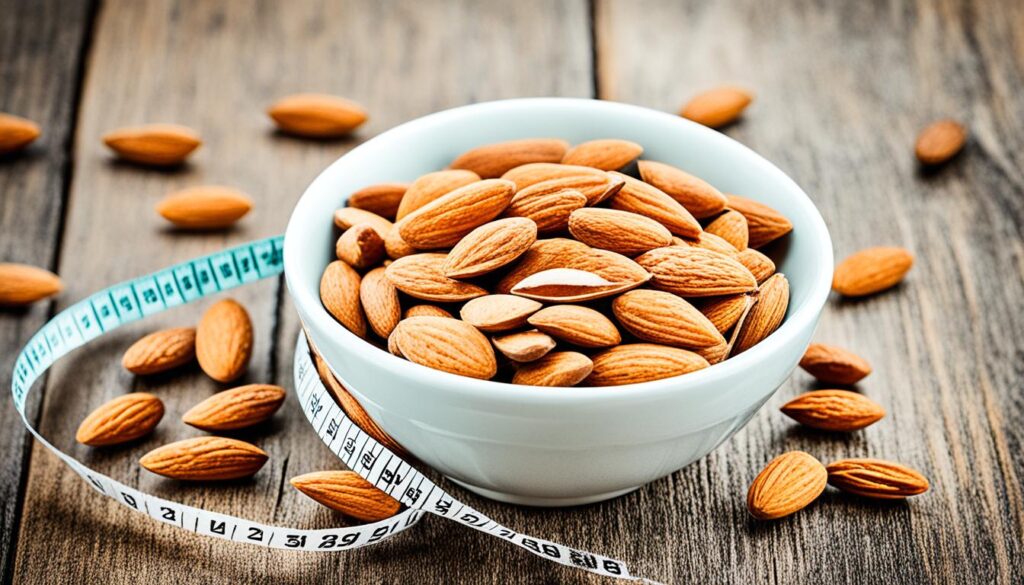
Although almonds offer numerous health benefits to humans, it is crucial to understand that rabbits have different digestive systems and nutritional needs. Feeding almonds to rabbits can lead to digestive issues and potentially harm their health. Therefore, it’s essential to prioritize a diet tailored to rabbits’ specific dietary requirements.
Why Almonds Are Not Safe for Rabbits
Almonds may be a popular snack for humans, but they are not safe for our furry friends. Rabbits have sensitive digestive systems that are specifically adapted to a high-fiber diet. The high fat content in almonds can pose significant risks to their health.
Excessive fat intake can lead to various digestive problems for rabbits, including the development of fatty liver disease. This condition can have serious consequences and even be life-threatening. It’s essential to prioritize a balanced diet for rabbits that meets their specific nutritional needs.
What makes almonds even more dangerous for rabbits is the presence of cyanide in bitter almonds. Cyanide is highly toxic to rabbits, and even a small amount can result in poisoning. Consumption of cyanide can cause severe symptoms and lead to fatal outcomes.
To keep our rabbit companions safe and healthy, it’s crucial to avoid feeding them almonds. Instead, we should focus on providing them with a diet that consists of fresh vegetables, hay, and commercially available rabbit food formulated to meet their nutritional requirements.

The Dangers of Almonds for Rabbits:
| Danger | Effects |
|---|---|
| High Fat Content | Can lead to digestive problems and fatty liver disease. |
| Cyanide in Bitter Almonds | Highly toxic to rabbits and can cause severe poisoning. |
Remember, the well-being of our rabbits is in our hands. Let’s provide them with a safe and balanced diet that excludes almonds and other potentially harmful foods.
What Happens if Rabbits Eat Too Many Almonds?
If rabbits consume excessive amounts of almonds, it can have severe effects on their health. Due to their inability to efficiently digest fats, the overconsumption of almonds can lead to gastrointestinal blockage and digestive issues in rabbits.
Rabbits may experience a range of symptoms as a result of consuming too many almonds. These can include dehydration, weight loss, depression, loss of appetite, bloating, and soft stool. These digestive issues can significantly impact a rabbit’s well-being and overall health.
“Overeating almonds can lead to organ failure and even death.”
In some cases, when rabbits overeat almonds, it can result in organ failure and even prove fatal. This is due to the high fat content of almonds and the challenges rabbits face in processing and metabolizing fats effectively.
If you notice any concerning symptoms or changes in your rabbit’s behavior after the consumption of almonds, it is essential to monitor their condition closely. If any signs of distress or discomfort arise, we recommend seeking immediate veterinary attention. Early intervention can help mitigate potential complications and safeguard your rabbit’s well-being.
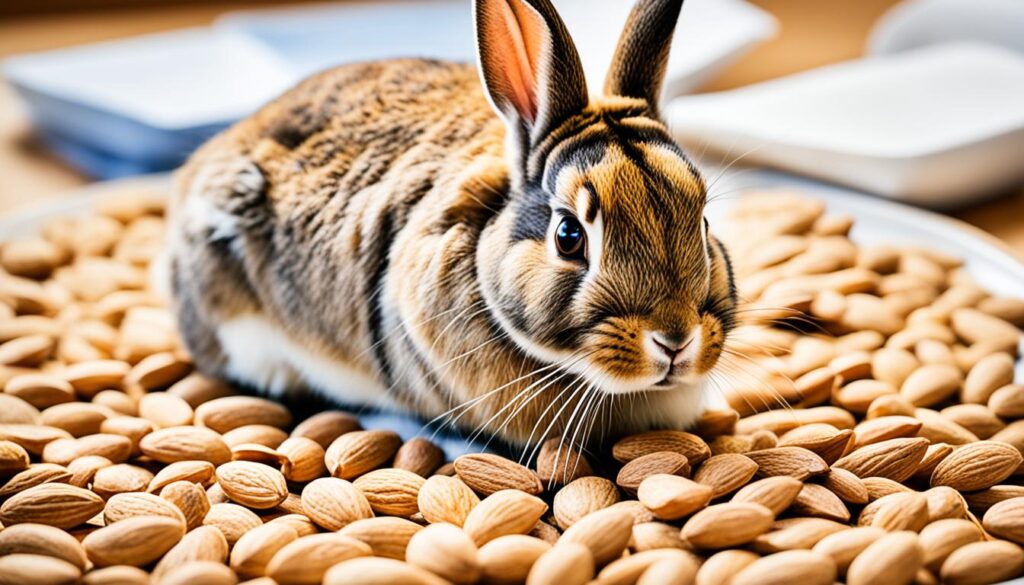
The Importance of Monitoring Rabbits’ Behavior
Monitoring your rabbit’s behavior is crucial to identify any adverse effects of almond overconsumption. By observing changes in their appetite, energy levels, and bowel movements, you can detect digestive issues early on and take appropriate action.
Safeguarding Your Rabbit’s Health
Providing a balanced and appropriate diet for your rabbit is essential for their overall health and well-being. While almonds should generally be avoided, there are many other safe and nutritious treats and foods available for rabbits. Fresh vegetables and high-quality hay are excellent choices to incorporate into their diet.
“If you’re unsure about your rabbit’s dietary needs or have concerns about their health, it’s always best to consult with a veterinarian.”
Your veterinarian can provide personalized guidance, ensuring your rabbit receives the necessary nutrients while avoiding potential risks associated with certain foods. They can help you establish a suitable diet plan tailored to your rabbit’s specific needs.
How Many Almonds Are Safe to Feed Your Rabbits?
While it is generally recommended to avoid feeding almonds to rabbits, if you still choose to offer them as a treat, it should be in very small amounts. One or two unsalted and unroasted almonds can be considered safe as an occasional treat.
However, it is crucial to observe rabbits’ behavior and monitor their poop color and texture after consuming almonds. Feeding rabbits almonds on a regular basis is not recommended due to the potential health risks and nutritional imbalances it can cause.
Recommended Almond Intake for Rabbits
| Almond Quantity | Frequency |
|---|---|
| One or two unsalted and unroasted almonds | Occasional treat |
Rabbits have specific dietary needs that are best met by a balanced and high-fiber diet. While almonds may seem like a tempting treat, it’s important to prioritize their overall health and well-being.
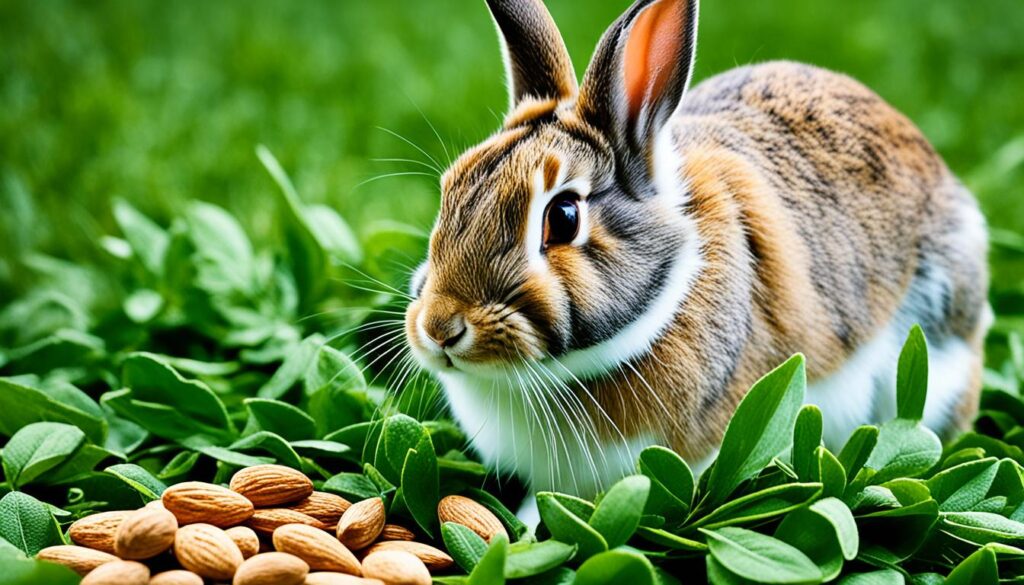
Remember, even though rabbits may enjoy the taste of almonds, their sensitive digestive systems may not be able to process them properly. It is always recommended to consult with a veterinarian for guidance on your rabbit’s diet and safe treat options. Providing a variety of fresh vegetables, hay, and appropriate rabbit pellets will ensure your furry friend receives the nutrition they need without compromising their health.
What to Do if Your Rabbit Eats Too Many Almonds
If your rabbit accidentally consumes too many almonds, immediate action is necessary. Excessive almond consumption can have detrimental effects on your rabbit’s health, and it’s essential to recognize the symptoms of almond poisoning in rabbits. Here are some signs to look out for:
- Lethargy: If your rabbit becomes unusually tired and lacks energy, it could be a symptom of almond overconsumption.
- Loss of appetite: A sudden decrease in your rabbit’s interest in food may indicate a problem.
- Dehydration: Keep an eye on your rabbit’s water intake and look for any signs of dehydration, such as dry gums or decreased urine output.
- Discolored fecal matter: Abnormal colors or textures in your rabbit’s stool can be a red flag.
- Alarming changes in behavior: Pay attention to any unusual behavior patterns, such as aggression or extreme nervousness.
If you observe these symptoms, it’s crucial to seek veterinary assistance immediately. A veterinarian will be able to provide appropriate treatment and support to mitigate any potential harm caused by almond overconsumption.
To prevent prolonged exposure to almonds and maintain the health of your rabbit, it is essential to offer a balanced diet that meets their specific nutritional requirements. Your veterinarian can provide guidance on the best diet for your rabbit’s well-being.
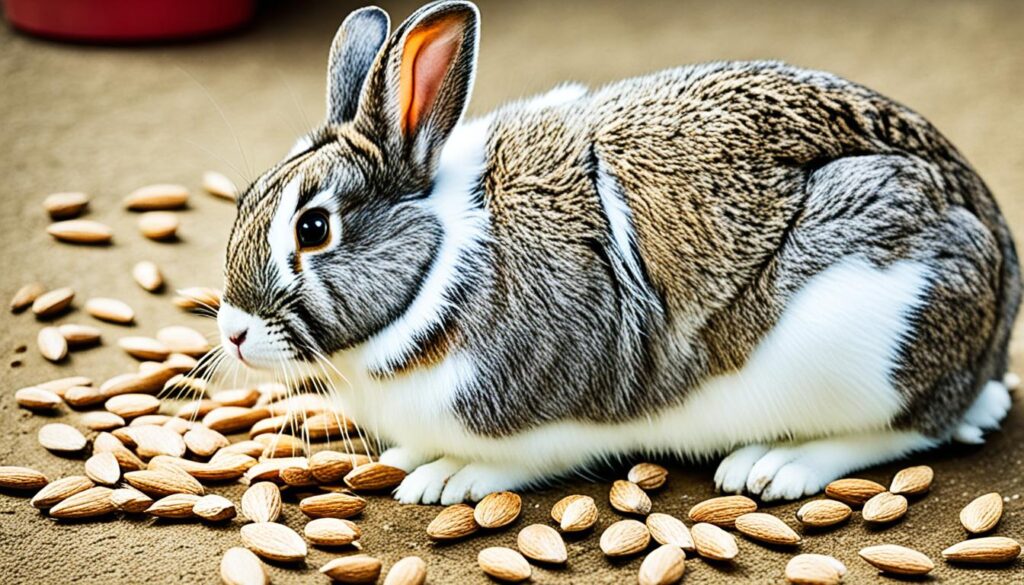
Conclusion
In conclusion, it is not safe for rabbits to eat almonds. The high fat content and the presence of cyanide in bitter almonds make them toxic for rabbits. Feeding almonds to rabbits can lead to digestive issues, nutritional imbalances, and potential poisoning. Therefore, it is important to prioritize a diet that meets rabbits’ specific nutritional needs, which includes a high-fiber intake.
Rather than offering almonds as a treat, there are many other healthy options available for rabbits. Fresh vegetables and hay are safer alternatives that provide essential nutrients and support their overall well-being. Remember to consult with a veterinarian for proper guidance on your rabbit’s dietary requirements.
Ensuring the health and safety of our furry friends is our responsibility, and choosing appropriate foods is a crucial part of that. Let’s prioritize the well-being of our rabbits by offering them a balanced diet that keeps them happy and healthy.
